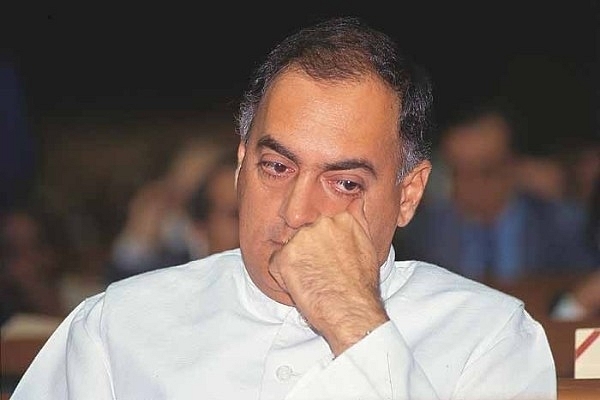Politics
The Quality Of Mercy: Should All Indians Forgive LTTE Assassin Because Rahul Gandhi Did So?
- Rahul Gandhi underwent a lot of emotional pain due to the assassination of his father, but that did not change his fate of ultimately becoming the Congress party president.The other grieving families, on the other hand, might have had lost their sole breadwinners on that day.

Rajiv Gandhi a victim of LTTE terror.
So the Congress party president Rahul Gandhi has forgiven his father and former prime minister Rajiv Gandhi’s killers. Indeed kshama daan is a one of the most pious charitable actions, which a person can carry out. The judiciary (or Indian state acting through judicial branch of governance) also granted clemency to the assassins by either reducing their capital punishment to imprisonment for life, or not carrying out the execution. Now, certain sections of the media have praised Rahul Gandhi’s magnanimity, and have tried to use this statement to position him as a more congenial leader before 2019 elections. Positive emotions indeed overcome negative ones and that is one of the strengths of the human mind.
However, there are a few things on which Indians should ponder before getting carried away by this projection of positive emotions. Firstly, we need to establish the identity of the person, who was the primary target on that fateful day. Was it only Rahul Gandhi and Priyanka Gandhi’s father, who had been killed or was it Sonia Gandhi’s husband, or was it Congress Party president, who had been murdered. Actually, the target was a popular Indian leader, who was probably on his way to become the next prime minister. So the right to forgive Liberation Tigers of Tamil Eelam (LTTE) killers does not solely rest with the Gandhi family.
It is for Indians to decide whether they would tolerate such a heinous crime against a prospective head of state, carried out with an aim of hijacking government’s domestic and foreign policies. Rahul Gandhi’s individual morality might compel him to forgive his father's assassins, but should our national morality also guide us to forgive a popular leader’s murder intended to strike fear in our minds.
Secondly, while Rajiv Gandhi was indeed the most important person to be killed that day, he was by no means the only one. Fourteen other innocent people were also massacred in cold blood leaving behind grieving families. The convicted terrorists did say in court that they did not intend to kill the other 14 people, but it is bewildering that it did not occur to them that detonating RDX amidst a large crowd will also cause other people to die. The inference being, that they were mercilessly willing to sacrifice other human lives just to hit their target. Had it been Indian Army which had caused a collateral damage in the ratio of 14:1 chasing a high-value terrorist, then the same media praising Rahul Gandhi would have been up in arms against it.
Thirdly, while the pitch of Gandhi sympathisers is that he is preaching love instead of hatred, is it possible that Rahul Gandhi is preaching soft approach towards terror instead of vigilance. Sure we all desire an ideal world with peace and prosperity and Rahul Gandhi is not the first one to teach that to us. But we should appreciate that few people have the astuteness of that of a realist. Does India need a leader who wants to wear a rosy glass towards terror and imagine that love and sympathy would win over those who want to threaten our sovereignty. As a private citizen, he might have the right to decide whether his father’s killers should be forgiven or not, but can a person eyeing the most important public office in the country be so much callous towards security of the country.
Compassion is a definitely a great quality. Gautam Buddha, being compassionate, forgave Angulimaal for the numerous murders he had committed. But it was not before the latter agreed to adopt non-violence and accept Dhamma. LTTE, on the other hand went on with its violent ways even after Rajiv Gandhi’s assassination. The fake remorse which they might have shown in the courts or in international press was not backed by their actions.
We need to ask ourselves whether our national character allows us to turn a blind eye towards perpetrators of terror. And if not, then should we be impressed by Rahul Gandhi’s saintly declaration of forgiveness or expect him to act like a leader, who is willing to develop a more realistic stance on enemies of the country.
Introducing ElectionsHQ + 50 Ground Reports Project
The 2024 elections might seem easy to guess, but there are some important questions that shouldn't be missed.
Do freebies still sway voters? Do people prioritise infrastructure when voting? How will Punjab vote?
The answers to these questions provide great insights into where we, as a country, are headed in the years to come.
Swarajya is starting a project with an aim to do 50 solid ground stories and a smart commentary service on WhatsApp, a one-of-a-kind. We'd love your support during this election season.
Click below to contribute.
Latest